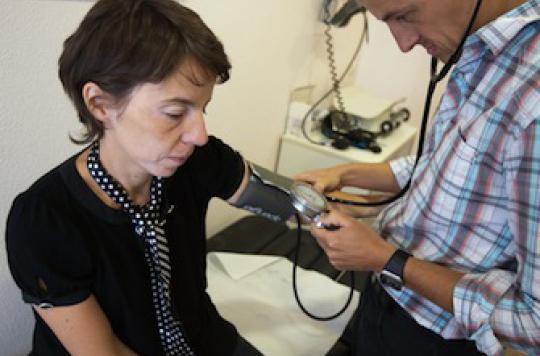The report of the General Inspectorate of Social Affairs is in favor of the advance fee waiver, even if it recommends some changes.

What if we no longer advance the costs by going to the doctor? Widely practiced in pharmacies, where only drugs that are not reimbursed are paid, the exemption from advance fees continues to be a minority for consultations in town with general practitioners or specialists. The implementation of third-party payment remains reserved for beneficiaries of CMU and AME and for certain acts, such as procedures over € 120, or procedures dispensed in health centers within emergency services.
But that could change. Last September, Marisol Touraine made the generalization of third-party payment the keystone of his national health strategy. For the Minister of Health, this “revolution” for equal access to care should take place in 2017.
It therefore entrusted an evaluation mission to the General Inspectorate of Social Affairs (IGAS) for the establishment of a full third party payment, that is to say “concerning the payment of the doctor by the health insurance. compulsory (AMO) and complementary health insurance (AMC) ”.
Written by Etienne Marie and Juliette Roger, the conclusions of this report of 133 pages published at the end of the week are in favor of the third-party payment system, even if certain points need to be clarified.
The change in the way doctors’ payment methods work is indeed a complex undertaking: in 2012, “109,981 general practitioners and liberal specialists billed nearly 523 million procedures, including 475 million to those insured under the general scheme”, recalls The report. In total, the fees of general practitioners represented 6.1 billion euros in 2012 and those of specialists 10.3 billion euros.
Facilitate access to care
For the evaluation mission, the generalization of third-party payment “is a very positive reform for all policyholders” which would facilitate access to healthcare, but could also help to regulate the use of emergency services (where policyholders do not do not have to advance the costs). The report recommends setting up a voluntary generalization, in order to “involve as much as possible […] on the one hand doctors, on the other hand AMOs and AMCs. ” The authors believe that voluntary generalization will lead to “de facto generalization” and propose to take stock 5 years after its implementation.
After evaluating the current operation of third-party payment, the report points to the fact that “the financial losses incurred by doctors following a rejection of their bill remain generally limited”. If the figures transmitted by the National Health Insurance Fund for Salaried Workers (CNAMTS) show “rejection rate [du paiement des médecins, parce que le patient n’est plus assuré par exemple] overall in the order of 1.19% for general practitioners and 1.32% for specialists ”, the report judges that these figures are in fact much lower. In addition, the report judges that the terms of payment of doctors are “globally controlled”, and that the “administrative burden associated with third-party payment has been limited by the development of certain software. “
More complex for the complementary part
However, the operation of the advance fee waiver turns out to be more complex for the additional part: the report criticizes “uncertainties as to the scope of the financial guarantee; payment terms deemed to be on the whole excessive; administrative formalities induced by the multiplicity of interlocutors present, all these factors contributing to a marginal practice of additional third-party payment ”.
The diversity of complementary organizations also generates variable practices in terms of physician payment. In order to remedy these problems, the mission proposes “the fundamental option of splitting the billing flows between compulsory health insurance and complementary health insurance, as soon as the latter would be grouped into a few management platforms.” This practice is already in place for other health professions and could be implemented quickly.
The report was particularly criticized by the Confederation of French Medical Syndicates, the main union of doctors, which judges that it is only a “smokescreen” which will not be able to set up “one more gas plant” […] “Which will be done at the expense of doctors because it is technically impracticable”.
.















